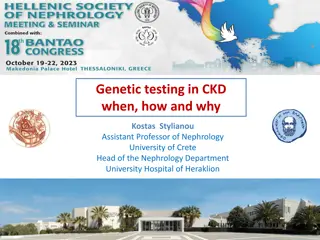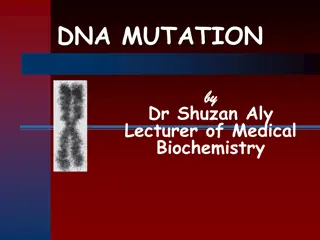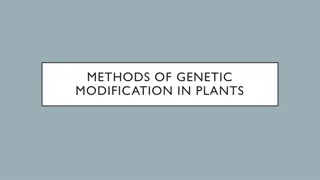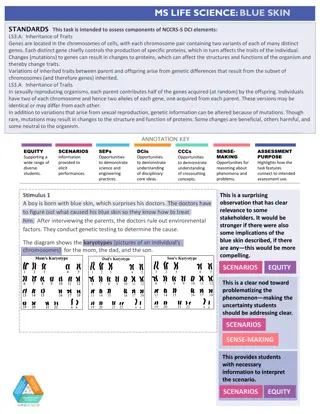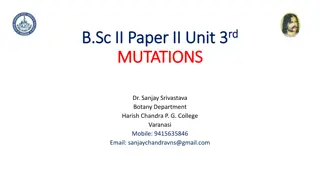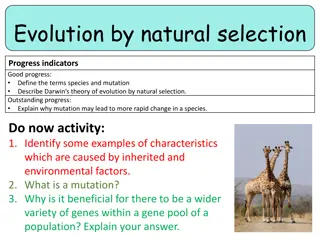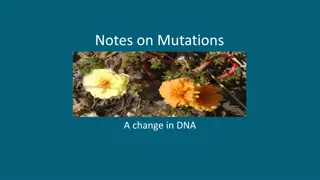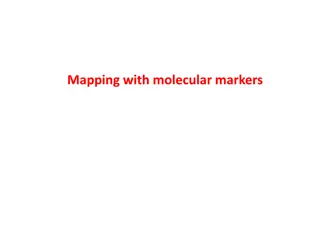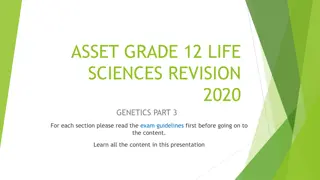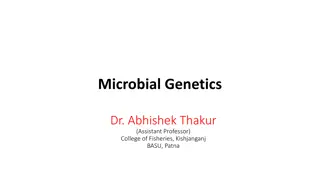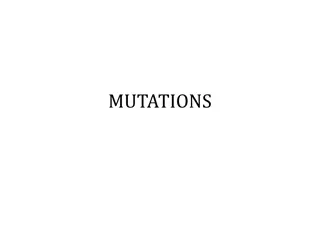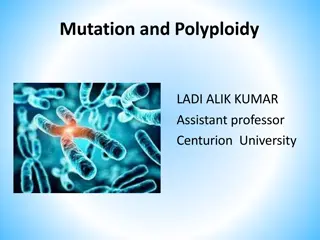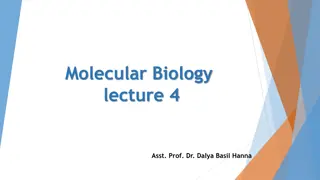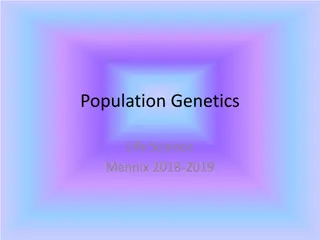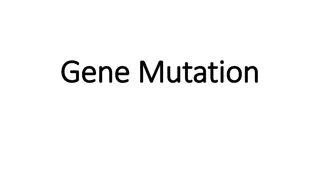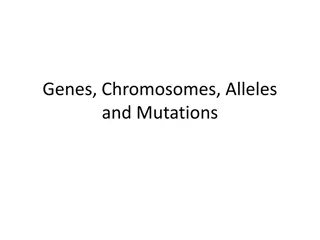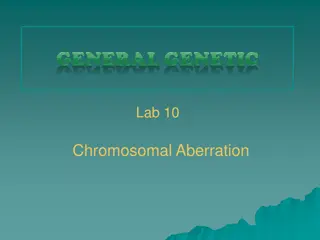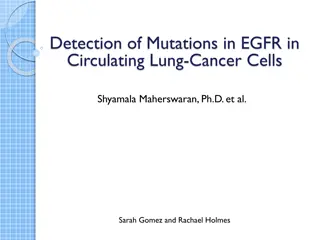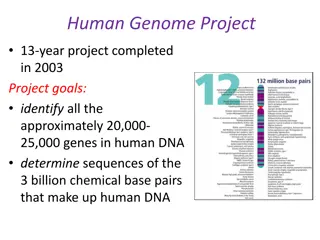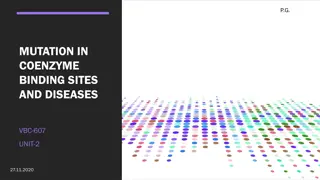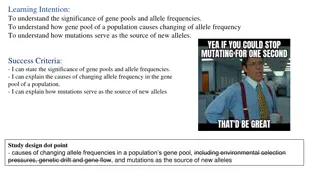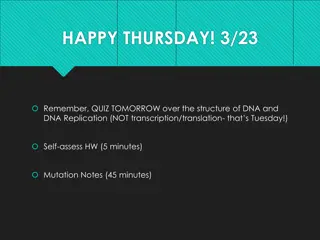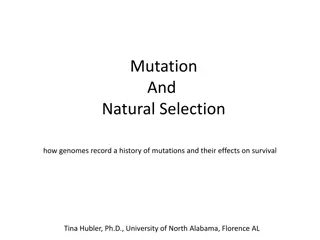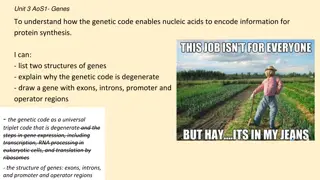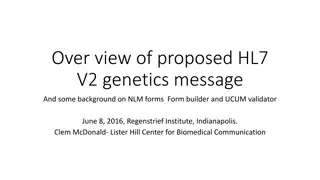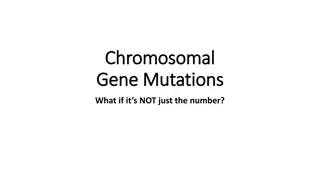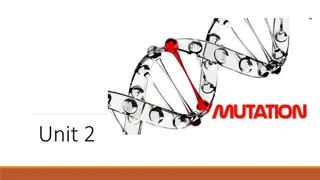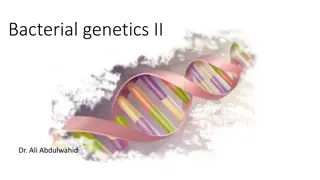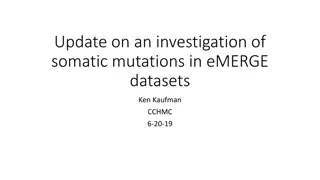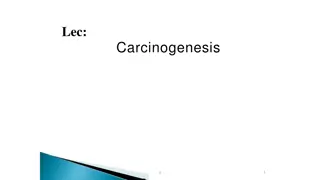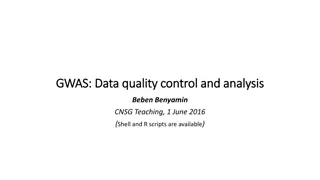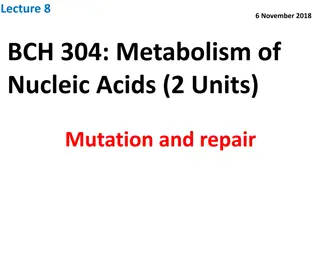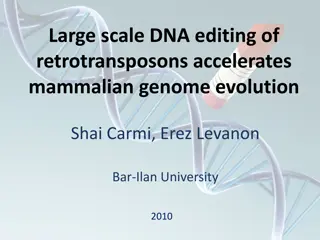Genetic Testing in Chronic Kidney Disease (CKD): Insights and Applications
Genetic testing plays a crucial role in identifying inherited kidney diseases, with around 15% of CKD cases having monogenic causes. Despite a high percentage of patients reporting a family history of CKD, Mendelian causes only account for about 10% of adult ESRD cases. Understanding the genetic bas
1 views • 52 slides
Understanding DNA Mutations and Their Types
DNA mutations are changes in the DNA molecule that can lead to permanent alterations in the base sequence of daughter DNA. Causes include uncorrected errors, as well as damage from oxidative deamination, radiation, and chemicals. The types of mutations include point mutations, insertion mutations, d
4 views • 7 slides
Different Methods of Genetic Modification in Plants
Genetic modification in plants can occur through natural selection, selective breeding, and induced mutations. Natural selection involves breeding compatible species to create offspring with desired traits, while selective breeding is a multi-generational process to breed organisms with specific cha
0 views • 11 slides
Understanding Inheritance of Traits Through Blue Skin Case Study
Assessing genetic inheritance and mutations using a case study of a boy with blue skin. The scenario highlights how genes control traits, the random assortment of chromosomes in offspring, and the impact of mutations on protein function. Students analyze karyotypes to infer genetic differences betwe
0 views • 6 slides
Understanding Mutations: Types, Characteristics, and Examples
Mutations are changes in the genetic material that can affect an organism's traits. This article explores gene mutations, their historical background, characteristics, kinds of mutations like spontaneous and induced, somatic and germinal mutations, and conditional lethal mutations. It also covers ge
2 views • 18 slides
Understanding Evolution by Natural Selection
Explore the concepts of species, mutation, Darwin's theory of evolution, and the role of genetic variation through mutations. Learn how mutations can lead to rapid changes in species and why a wider variety of genes in a gene pool benefits a population. Delve into the effects of mutations on individ
0 views • 15 slides
Understanding Mutations in DNA and Their Effects
Mutations in DNA are changes that can occur in body cells or gametes, leading to alterations in the genetic code. Not all mutations are harmful, but they can impact protein structure and function. Different types of mutations, such as substitutions, insertions, and deletions, can result from various
0 views • 11 slides
Understanding Genetic Markers in Molecular Mapping
Genetic markers play a crucial role in gene mapping within molecular biotechnology. They are fragments of DNA associated with specific genomic locations, aiding in identifying DNA sequences and analyzing genetic variation. Various types of genetic markers such as RFLP, SSR, and SNP offer insights in
1 views • 26 slides
Pediatric Patient with DIPG/DMG and Genetic Mutations
This case study presents a 0.5-year-old patient diagnosed with Diffuse Intrinsic Pontine Glioma (DIPG) and Diffuse Midline Glioma (DMG) with genetic mutations in H3F3A and TP53. The patient has not undergone prior treatment and is at WHO grade IV stage. Images of tissue samples and stains are provid
1 views • 4 slides
Understanding Genetics: Mutations, Chromosomal Aberrations, and Genetic Engineering
Genetic mutations can be harmless, harmful, or beneficial, leading to variations within a species. Examples of gene mutations and chromosomal aberrations, like Trisomy 21, illustrate genetic abnormalities. The increase in Down Syndrome cases with maternal age highlights a maternal age effect. Geneti
0 views • 17 slides
Understanding Microbial Genetics and Mutations in Organisms
Explore the world of microbial genetics with Dr. Abhishek Thakur, an Assistant Professor specializing in Microbial Genetics at the College of Fisheries, Kishjanganj, BASU, Patna. Learn about important concepts such as strains, clones, genome, phenotype, genotype, genes, genetic recombination, and mu
0 views • 19 slides
Understanding Mutations in Biology
A mutation in biology refers to changes in the nucleotide sequence of an organism's genome. These alterations can either be harmful, leading to conditions like cancer, or beneficial, such as providing antibiotic resistance. Mutations can occur in somatic cells or gametes, affecting both the individu
1 views • 18 slides
Understanding Mutation and Polyploidy in Genetics
Mutation is a sudden hereditary change in an organism's genetic makeup, leading to variations in offspring. This article delves into the history, types, and causes of mutations, featuring significant discoveries by scientists like De Vries and Morgan. It also explores the concept of spontaneous muta
0 views • 50 slides
Understanding Gene Mutations in Molecular Biology
Gene mutations play a significant role in molecular biology, leading to alterations in DNA sequences that can impact offspring. These mutations can arise spontaneously or be induced by various factors, such as mutagens. Understanding gene mutations is crucial for comprehending the genetic basis of c
2 views • 27 slides
Understanding Population Genetics and Allele Frequency Changes
Population genetics explores how allele frequencies change within populations due to factors like mutations, migration, genetic drift, nonrandom mating, and natural selection. Mutations introduce new variations, migration affects gene flow, genetic drift causes random allele loss, and examples like
1 views • 18 slides
Understanding Gene Mutations and Their Impact on DNA Sequences
Gene mutations are changes in the nucleotide sequence of DNA, leading to potential amino acid alterations in proteins. These mutations can occur due to replication errors or external factors like chemicals and radiation. Different types of mutations, such as base substitutions, transitions, transver
0 views • 11 slides
Understanding Genetic Counselors and the NSGC
Genetic counselors play vital roles in healthcare by assisting patients with genetic conditions, advocating for their needs, educating providers, conducting research, and influencing public policy. The National Society of Genetic Counselors (NSGC) supports genetic counselors in their professional en
3 views • 12 slides
Understanding Genes, Chromosomes, Alleles, and Mutations in DNA
Explore the intricate world of genetics through genes, chromosomes, alleles, and mutations. Delve into the fundamental structures of DNA, such as nucleosomes and eukaryotic chromosomes. Gain insights into key genetic terms like genes, alleles, and genome composition. Learn about mutations, including
0 views • 11 slides
Understanding Chromosomal Aberrations and Mutations in Genetics
Chromosomal aberrations and mutations are key events that can alter the genetic structure of organisms. They can lead to numerical abnormalities like aneuploidy and structural abnormalities such as ring chromosomes and chromosome fragments. Understanding these variations in chromosomes is crucial in
0 views • 10 slides
Understanding Mutations: Types and Effects
Explore the world of mutations in this informative content covering topics such as how superheroes like Cyclops, Hulk, and Spiderman acquired their powers, the different types of mutations including small-scale mutations like substitution, deletion, and insertion, as well as large-scale mutations af
0 views • 23 slides
Understanding Transition Bias and Substitution Models in Genetics
Transition bias and substitution models, explored by Xuhua Xia, delve into the concepts of transitions and transversions in genetic mutations, the causes of transition bias, the ubiquitous nature of transition bias in invertebrate and vertebrate genes, the mitochondrial genetic code, and RNA seconda
1 views • 25 slides
Detection of Mutations in EGFR in Circulating Lung Cancer Cells: Study on SARMS Assay and CTC-Chip
This study by Shyamala Maherswaran, Ph.D., and team focuses on characterizing mutations in EGFR in circulating tumor cells using SARMS assay and CTC-chip. The research investigates the effectiveness of these non-invasive methods in analyzing tumors and explores the role of the T790M mutation in resp
0 views • 12 slides
Evolutionary Computation and Genetic Algorithms Overview
Explore the world of evolutionary computation and genetic algorithms through a presentation outlining the concepts of genetic algorithms, parallel genetic algorithms, genetic programming, evolution strategies, classifier systems, and evolution programming. Delve into scenarios in the forest where gi
0 views • 51 slides
Understanding Genetic Disorders and the Human Genome Project
The Human Genome Project, completed in 2003, aimed to identify all human genes and DNA sequences. Genetic disorders, like autosomal disorders and Huntington's disease, can result from mutations at different levels, affecting single genes, chromosomes, or multiple genes. Albinism and cystic fibrosis
0 views • 37 slides
Understanding Mutations: Types, Causes, and Significance
Explore the world of gene mutations and chromosome mutations, including point mutations, frameshift mutations, and changes in chromosome structure. Learn about the significance of mutations, how they can be inherited or acquired, and their impact on genetic information. Uncover examples of neutral,
0 views • 9 slides
Mutations in Coenzyme Binding Sites and Related Diseases
Mutations in coenzyme binding sites can lead to diseases by impacting enzyme affinity and reaction rates. Defects in proteins like ornithine aminotransferase and cystathionine-synthase result in conditions such as gyrate atrophy of the choroid and retina, homocystinuria, and X-linked sideroblastic a
0 views • 14 slides
Understanding Gene Pools, Allele Frequencies, and Mutations in Population Genetics
Dive into the significance of gene pools and allele frequencies, exploring how mutations drive the emergence of new alleles. Learn about factors impacting allele frequencies like mutations, environmental pressures, genetic drift, and gene flow. Discover the types of mutations and their effects on po
0 views • 13 slides
Understanding Mutations and Their Effects on DNA
Learn about the structure of DNA, DNA replication, and various types of mutations such as substitution, deletion, and insertion. Explore how mutations occur, their effects at the molecular level, and how environmental factors can influence them. Discover the impact of mutations through examples of s
0 views • 17 slides
Understanding Mutations and Natural Selection in Genomes
Explore how mutations impact survival and how genomes record these changes, distinguishing between functional and nonfunctional sequences. Learn about the effects of mutations on organism survival and the role of natural selection in shaping genetic variability.
0 views • 11 slides
Understanding Genes and the Genetic Code for Protein Synthesis
Explore the structures of genes, the degeneracy of the genetic code, and the process of protein synthesis through transcription, RNA processing, and translation. Delve into the role of exons, introns, promoters, and operators in gene expression in eukaryotic cells. Learn why the genetic code is dege
0 views • 13 slides
Understanding Mutations in Biology: Clicker Questions Explained
Explore a series of clicker questions related to mutations in biology, covering topics such as the definition of mutations, their effects, inheritance patterns, and the impact on amino acid sequences. Gain insights into how mutations occur, their consequences, and their role in genetic processes.
0 views • 18 slides
Overview of HL7 V2 Genetics Messaging and LOINC Genetic Testing Codes
This content delves into the proposed HL7 V2 genetics message, NLM forms builder, UCUM validator, and the current state of genetic testing codes in LOINC. It discusses the types of molecular genetic tests present in LOINC and the evolution towards newer genetic tests. The content also covers how LOI
0 views • 21 slides
Understanding Chromosomal and Gene Mutations in Genetics
Chromosomal and gene mutations play a crucial role in genetic variations. Mutations such as insertion, deletion, and substitution can lead to significant changes in DNA sequences, affecting gene expression and cellular functions. Additionally, chromosomal mutations like deletion, amplification, inve
0 views • 15 slides
Understanding Genetic Mutation and Its Impact on Evolution
Genetic mutations are a natural process that introduces variations in DNA sequences, creating new alleles and genetic diversity within populations. These mutations can have both positive and negative effects on individuals, influencing survival and reproduction. By examining different types of mutat
0 views • 28 slides
Understanding Bacterial Genetics: Phenotypic and Genotypic Variability
Phenotypic and genotypic variations in bacteria are crucial for their adaptation and survival. Phenotype reflects the physical expression influenced by both the genome and the environment, while genotype represents the hereditary constitution passed to offspring. Mutations are a primary source of ge
0 views • 23 slides
Comprehensive Analysis of Somatic Mutations in eMERGE Datasets
This investigation delves into somatic mutations across normal tissues, revealing macroscopic clonal expansions. The study processed a large number of samples and identified candidate mutations, with characteristics and functional predictions detailed. Genes with the most somatic mutations are highl
0 views • 24 slides
Understanding the Fundamentals of Carcinogenesis and Cancer Hallmarks
Carcinogenesis involves non-lethal genetic damage, clonal expansion of precursor cells, and multi-step processes, with the involvement of normal regulatory genes. The hallmarks of cancer include self-sufficiency in growth signals, insensitivity to inhibitory signals, evasion of cell death, replicati
0 views • 16 slides
Understanding GWAS: A Brief Overview of Genetic Association Studies
GWAS, or Genome-Wide Association Studies, are a method used to map genes associated with traits or diseases by analyzing genetic markers throughout the genome. This process involves statistically testing the association between SNPs and traits using regression or chi-squared tests in a hypothesis-fr
0 views • 19 slides
Understanding Causes of Mutations and Repair Mechanisms
Mutations can be classified into spontaneous and induced mutations based on their origin. Spontaneous mutations occur naturally, while induced mutations are caused by mutagens. Understanding the causes of mutations and repair mechanisms is vital in studying genetic variation and disease development.
0 views • 13 slides
DNA Editing of Retrotransposons and Mammalian Genome Evolution
Large-scale DNA editing of retrotransposons plays a crucial role in accelerating mammalian genome evolution. Retrotransposons, accounting for half of the human genome, are mobile elements that can lead to mutations and genetic disorders but also serve as a reservoir for genetic innovation, rewiring
0 views • 26 slides
